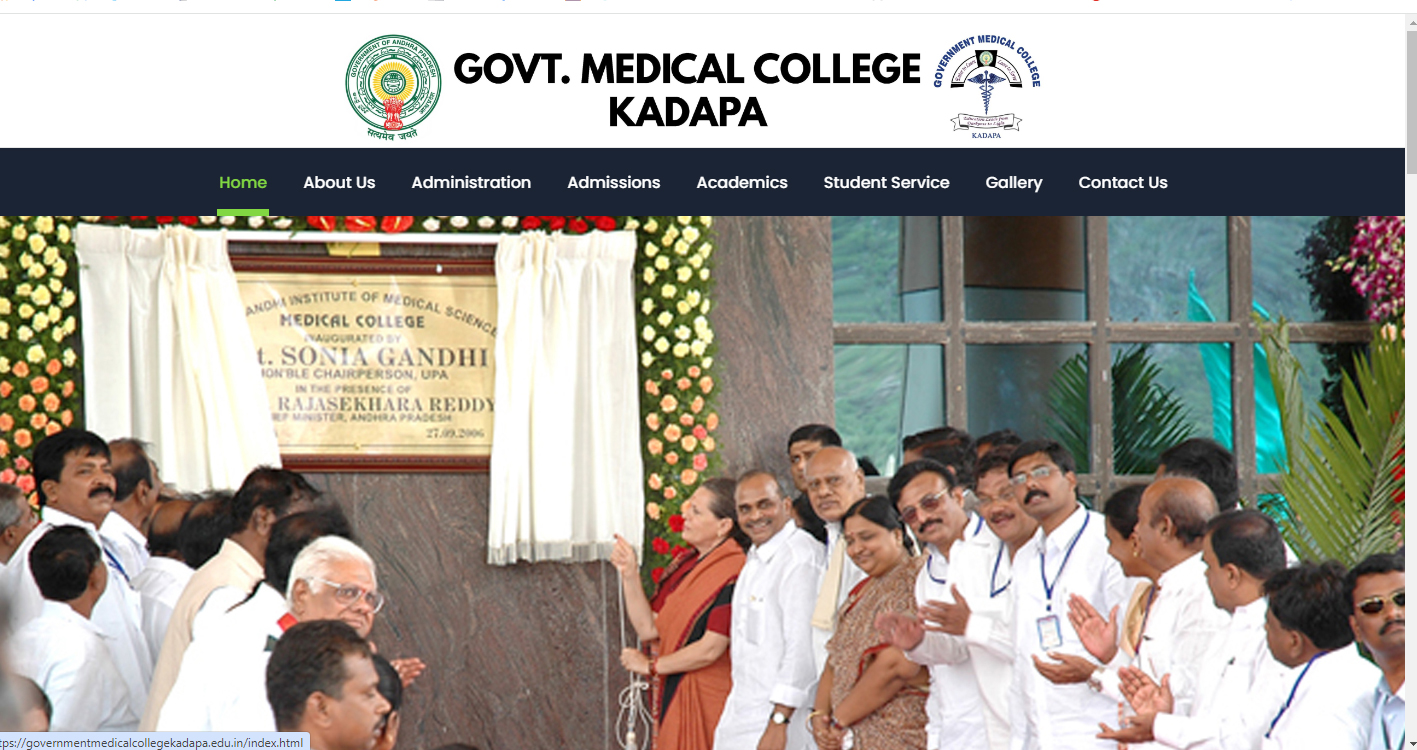
Rajiv Gandhi Institute of Medical Sciences, Kadapa
is one of the best government institutes in the country. It was founded in 2006 by the state of Andhra Pradesh with the goal of improving quality medical care in this underserved area and receiving clinical instruction from all trained students in the area. RIMS Kadapa was carried out during a 14-month period at 210 locations throughout the world, with a focus on high-quality development and quick completion. Rims General Hospital, a local clinic, had previously been the emergency clinic of choice. It was eventually changed into the Rajiv Gandhi Institute of Medical Sciences, a higher education emergency medical facility. The emergency clinic stayed in the same site during the current stages of RIMS planning before being shifted to its new location. From its origin to the present, it has gone through a constant cycle of constructive activities. The Medical Council of India has authorized Rajiv Gandhi Institute of Medical Sciences, which is associated with NTR University of Health Sciences in Vijayawada (MCI).
HIKSHAMITRA EDUCATION PVT. LTD.
Office No: 107 1st Floor, Vishal Chambers, Sector 18, Noida, Uttar Pradesh 201301
18005723133
M.B.B.S.

Bachelor of Medicine, Bachelor of Surgery (Latin: Medicinae Baccalaureus, Baccalaureus Chirurgiae; abbreviated in many ways, most commonly MBBS, but also MB ChB, BMBS, MB BCh, MB BChir), is the primary medical degree awarded by medical schools in countries that follow the tradition of the United Kingdom. The historical degree nomenclature states that they are two separate undergraduate degrees. In practice, however, they are usually combined as one and conferred together, and may also be awarded at graduate-level medical schools.
Bachelor of Medicine and Bachelor of Surgery (MBBS), is a professional degree in medical science. A person holding the MBBS degree becomes a certified medical practitioner. The duration of MBBS course is five years and six months including one year of rotational internship at hospitals, health centres, and health camps organised by non-profit organisations (NGOs). MBBS course syllabus includes studies on anatomy, pharmacology, pathology as well as community health & medicine, paediatrics, and surgery. The syllabus, prescribed in such a way that MBBS degree holders can choose a specialisation for further majoring and practising medicine. The career specialisations for MBBS students are Nephrology, Cardiology, Gynecology, Anesthesiology, Organ Transplant, Endocrine, and General Surgery, etc.
MD - Anaesthesiology
The purpose of PG education is to create specialists who would provide high quality health care and advance the cause of science through research & training. A post graduate specialist having undergone the required training in anesthesiology should be able to recognize the health needs of the community. He or she should be competent to handle effectively medical problems and should be aware of the recent advances pertaining to his/her specialty. She/he should be highly competent anesthesiologist with broad range of skills that will enable him/her to practice anesthesiology independently. The PG student should also acquire the basic skills in teaching of medical/para-medical students. She/he is also expected to know the principles of research methodology and modes of consulting library. She/he should attend conferences, workshops and CMEs regularly to upgrade his/her knowledge. The purpose of this document is to provide teachers and learners illustrative guidelines to achieve defined outcomes through learning and assessment. This document was prepared by various subject-content specialists. The Reconciliation Board of the Academic Committee has attempted to render uniformity without compromise to purpose and content of the document. Compromise in purity of syntax has been made in order to preserve the purpose and content. This has necessitated retention of “domains of learning” under the heading “competencies”
MD - Dermatology , Venereology & Leprosy
MD - General Medicine
MD - Physiology
MD/MS - Anatomy
MD/MS - Obstetrics & Gynaecology
MD/MS - Ophthalmology
MS - ENT
MS - General Surgery
- Log in to post comments
- 129 views
